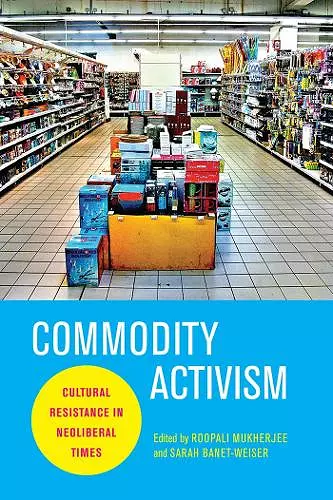Commodity Activism
Cultural Resistance in Neoliberal Times
Sarah Banet-Weiser editor Roopali Mukherjee editor
Format:Paperback
Publisher:New York University Press
Published:1st Feb '12
Currently unavailable, and unfortunately no date known when it will be back
This paperback is available in another edition too:
- Hardback£73.00(9780814764008)

Discusses what happens when the most common way we participate in social activism is by buying something
Buying (RED) products—from Gap T-shirts to Apple—to fight AIDS.
Drinking a “Caring Cup” of coffee at the Coffee Bean & Tea Leaf to
support fair trade. Driving a Toyota Prius to fight global warming. All
these commonplace activities point to a central feature of contemporary
culture: the most common way we participate in social activism is by
buying something.
Roopali Mukherjee and Sarah Banet-Weiser have gathered an exemplary
group of scholars to explore this new landscape through a series of case
studies of “commodity activism.” Drawing from television, film,
consumer activist campaigns, and cultures of celebrity and corporate
patronage, the essays take up examples such as the Dove “Real Beauty”
campaign, sex positive retail activism, ABC’s Extreme Home Makeover, and
Angelina Jolie as multinational celebrity missionary.
Exploring the complexities embedded in contemporary political activism, Commodity Activism
reveals the workings of power and resistance as well as citizenship and
subjectivity in the neoliberal era. Refusing to simply position
politics in opposition to consumerism, this collection teases out the
relationships between material cultures and political subjectivities,
arguing that activism may itself be transforming into a branded
commodity.
"Without doubt this important collection of essays will contribute significantly to the new and growing field of 'critical consumer studies'." -- J.R. Mitrano * CHOICE *
"Commodity activism has a long history but never has its significance been more complex to unravel than today, when the boundaries and direction of political action are unclear, commercial forces mobilize consumers values to secure their emotional loyalty, and individual consumers hope their choices mean that & something is being done. Roopali Mukherjee and Sarah Banet-Weiser's smart, empirically rich and globally wide-ranging new collection provides us with very welcome coordinates in this difficult terrain." -- Nick Couldry,author of Why Voice Matters: Culture and Politics After Neoliberalism
"Commodity Activism is eminently useful. Mukherjee and Banet-Weisers collection is animportant intervention into what had become a tired debate about political agency and consumer culture. It is also a very timely anthology, helping us better understand the practices of a current generation ofactivists who recognize that the terrain upon which they struggle is not some idealized land of pure politics outside the influence of consumer culture, but instead, a challenging topography of brands and logos, style and story, celebrity and spectacle." * International Journal of Communication *
"Commodity Activism will be out of interest to a wide range of scholars, including those focused on critical/consumer studies, American studies, media studies, and critical rhetorical studies. Any academic interested in exploring consumer politics, or contemporary trends in social activism, or in constituting social controversy, will find this text replete with starting points for future scholarship." * Journal of American Culture *
ISBN: 9780814764015
Dimensions: unknown
Weight: 454g
314 pages